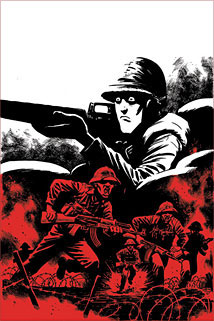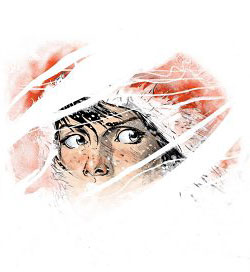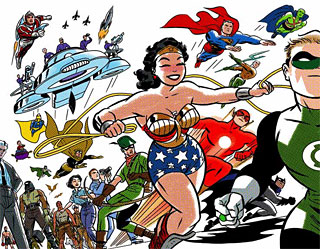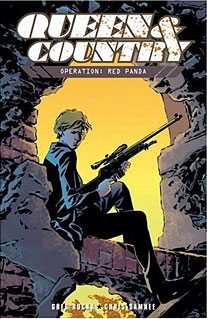The Modern Comic Book
By Bert Ehrmann
May 2, 2008
 Over the last winter with the television writer’s strike obliterating much of the new scripted television series of the season, I found myself with the unenviable task of finding alternatives to Indiana’s famous “stuck inside with nothin’ to do” winter blahs. I briefly toyed with reality TV (mistake) but luckily found something just as good (if not better) than most of what passes for entertainment these days – the modern comic book/graphic novel.
Over the last winter with the television writer’s strike obliterating much of the new scripted television series of the season, I found myself with the unenviable task of finding alternatives to Indiana’s famous “stuck inside with nothin’ to do” winter blahs. I briefly toyed with reality TV (mistake) but luckily found something just as good (if not better) than most of what passes for entertainment these days – the modern comic book/graphic novel.
It’s a bit hard to talk about the comic series The Other Side without drawing comparisons to the film Full Metal Jacket (FMJ) since each share a skewed view of the war in Vietnam. Though much of the bent of FMJ comes from the irony of war, the skew of The Other Side comes from the inner demons of main character Private Bill Everette and the visions of North Vietnamese soldier Vo Binh share. Everette is haunted by the disfigured and blasted ghosts of American G.I.s with a rifle that says things like “put me in your mouth” while Vo Binh sees things of a more spiritual nature.
But no matter the vision, the terrors and horrors of war touch each soldier equally. On a basic level, The Other Side is about how war can destroy the souls of the combatants.
 Another comic favorite of mine is the series Whiteout and to a lesser extent the follow-up Whiteout: Melt. In Whiteout, U.S. Marshal Carrie Stetko is assigned to a large science station in Antarctica when a murder breaks the relative calm of the base. Carrie, one of the few females at the station and the only real law for thousands of miles, finds herself with the unenviable task of tracking down the murderer before the base closes up for the season with the personnel and scientists packing up and going home. As Stetko draws closer to the killer, the she’s forced to rely on her wits rather than weapons as guns are outlawed on the continent.
Another comic favorite of mine is the series Whiteout and to a lesser extent the follow-up Whiteout: Melt. In Whiteout, U.S. Marshal Carrie Stetko is assigned to a large science station in Antarctica when a murder breaks the relative calm of the base. Carrie, one of the few females at the station and the only real law for thousands of miles, finds herself with the unenviable task of tracking down the murderer before the base closes up for the season with the personnel and scientists packing up and going home. As Stetko draws closer to the killer, the she’s forced to rely on her wits rather than weapons as guns are outlawed on the continent.
Think the movies Outland (1981) and The Thing (1982) minus the monster and you’re close to the tone and feel of Whiteout. A film version of Whiteout starring Kate Beckinsale as Carrie is due in theaters later this year.
Only after I picked up the DVD release of Justice League: The New Frontier did I bother to check out the comic series it was based on, New Frontier. I was utterly amazed at the quality of both the story and art of New Frontier that was skillfully created, written and drawn by animation storyboard artist turned comic artist Darwyn Cooke.
 Set in the late 1950s and early 1960s, retro-cool New Frontier is essentially an origin story for the DC Comics team Justice League. New Frontier takes an interesting angle on the origin story for many of the characters blending realism with a comic book sensibility to create something new. New Frontier did something I didn’t think possible for a modern comic book; be timely and well written while at the same time discarding much of the “dark” themes that has permeated comic books the last 20 years. New Frontier is as fresh as it is uplifting.
Set in the late 1950s and early 1960s, retro-cool New Frontier is essentially an origin story for the DC Comics team Justice League. New Frontier takes an interesting angle on the origin story for many of the characters blending realism with a comic book sensibility to create something new. New Frontier did something I didn’t think possible for a modern comic book; be timely and well written while at the same time discarding much of the “dark” themes that has permeated comic books the last 20 years. New Frontier is as fresh as it is uplifting.
 I can’t quite remember what originally got me hooked on the series Queen and Country, but whatever it was I’m glad for it. Queen and Country is essentially a modern retelling of the TV series The Sandbaggers that follows operatives from a faux British intelligence service known as the Special Operations Service (SIS) as they span the globe on missions of espionage. The theme of Queen and Country changed greatly after the events of 9/11 with the SIS and lead character Tara Chance tasked with hunting down terrorist enemies both foreign and domestic.
I can’t quite remember what originally got me hooked on the series Queen and Country, but whatever it was I’m glad for it. Queen and Country is essentially a modern retelling of the TV series The Sandbaggers that follows operatives from a faux British intelligence service known as the Special Operations Service (SIS) as they span the globe on missions of espionage. The theme of Queen and Country changed greatly after the events of 9/11 with the SIS and lead character Tara Chance tasked with hunting down terrorist enemies both foreign and domestic.
If I had more room, I’d go on about the series Gotham Central that follows police officers and detectives operating within the confines of Batman’s home turf or DMZ about a modern day civil war with New York City acting as the frontline with much of the populous trapped within. It’s the Katrina disaster mixed with elements of the film Salvador (1986). Regardless, all of the comics described above are winners in my book.